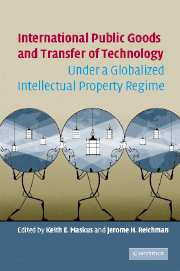Book contents
- Frontmatter
- Contents
- List of contributors
- Preface
- PART I International Provision of Public Goods under a Globalized Intellectual Property Regime
- PART II Innovation and Technology Transfer in a Protectionist Environment
- PART III Sectoral Issues: Essential Medicines and Traditional Knowledge
- PART IV Reform and Regulation Issues
- 22 Issues Posed by a World Patent System
- 23 Intellectual Property Arbitrage: How Foreign Rules Can Affect Domestic Protections
- 24 An Agenda for Radical Intellectual Property Reform
- Comment: Whose Rules, Whose Needs? Balancing Public and Private Interests
- 25 Diffusion and Distribution: The Impacts on Poor Countries of Technological Enforcement within the Biotechnology Sector
- 26 Equitable Sharing of Benefits from Biodiversity-Based Innovation: Some Reflections under the Shadow of a Neem Tree
- 27 The Critical Role of Competition Law in Preserving Public Goods in Conflict with Intellectual Property Rights
- 28 Expansionist Intellectual Property Protection and Reductionist Competition Rules: A TRIPS Perspective
- 29 Can Antitrust Policy Protect the Global Commons from the Excesses of IPRs?
- Comment I: Competition Law as a Means of Containing Intellectual Property Rights
- 30 “Minimal” Standards for Patent-Related Antitrust Law under TRIPS
- Comment II: Competitive Baselines for Intellectual Property Systems
- 31 WTO Dispute Settlement: Of Sovereign Interests, Private Rights, and Public Goods
- 32 The Economics of International Trade Agreements and Dispute Settlement with Intellectual Property Rights
- 33 Intellectual Property Rights and Dispute Settlement in the World Trade Organization
- 34 WTO Dispute Resolution and the Preservation of the Public Domain of Science under International Law
- 35 Recognizing Public Goods in WTO Dispute Settlement: Who Participates? Who Decides? The Case of TRIPS and Pharmaceutical Patents Protection
- Index
29 - Can Antitrust Policy Protect the Global Commons from the Excesses of IPRs?
Published online by Cambridge University Press: 05 May 2010
- Frontmatter
- Contents
- List of contributors
- Preface
- PART I International Provision of Public Goods under a Globalized Intellectual Property Regime
- PART II Innovation and Technology Transfer in a Protectionist Environment
- PART III Sectoral Issues: Essential Medicines and Traditional Knowledge
- PART IV Reform and Regulation Issues
- 22 Issues Posed by a World Patent System
- 23 Intellectual Property Arbitrage: How Foreign Rules Can Affect Domestic Protections
- 24 An Agenda for Radical Intellectual Property Reform
- Comment: Whose Rules, Whose Needs? Balancing Public and Private Interests
- 25 Diffusion and Distribution: The Impacts on Poor Countries of Technological Enforcement within the Biotechnology Sector
- 26 Equitable Sharing of Benefits from Biodiversity-Based Innovation: Some Reflections under the Shadow of a Neem Tree
- 27 The Critical Role of Competition Law in Preserving Public Goods in Conflict with Intellectual Property Rights
- 28 Expansionist Intellectual Property Protection and Reductionist Competition Rules: A TRIPS Perspective
- 29 Can Antitrust Policy Protect the Global Commons from the Excesses of IPRs?
- Comment I: Competition Law as a Means of Containing Intellectual Property Rights
- 30 “Minimal” Standards for Patent-Related Antitrust Law under TRIPS
- Comment II: Competitive Baselines for Intellectual Property Systems
- 31 WTO Dispute Settlement: Of Sovereign Interests, Private Rights, and Public Goods
- 32 The Economics of International Trade Agreements and Dispute Settlement with Intellectual Property Rights
- 33 Intellectual Property Rights and Dispute Settlement in the World Trade Organization
- 34 WTO Dispute Resolution and the Preservation of the Public Domain of Science under International Law
- 35 Recognizing Public Goods in WTO Dispute Settlement: Who Participates? Who Decides? The Case of TRIPS and Pharmaceutical Patents Protection
- Index
Summary
Introduction
Can antitrust protect the global commons from the excesses of intellectual property protection?
Antitrust law might be seen as a natural tool to limit excessive IP monopolies, for antitrust law protects competition and competition is the antithesis of monopoly. This chapter gives small comfort, however, to those who hope to restrike a balance in favor of more antitrust and less intellectual property protection. The most obvious channels through which antitrust could assert greater dominance over intellectual property protections (e.g., an antitrust duty to license) are not available in many or most jurisdictions. The chapter ends by exploring one less obvious channel wherein antitrust law might modestly push back the boundaries of undue IP protection; namely, limiting the antitrust doctrine of immunity for petitioning the government for an anticompetitive measure or outcome. The cases drawn upon are from the United States, but the doctrine of immunity is shared by most antitrust jurisdictions in the world.
The point is a small one and is raised not because it could give great relief to the problem of anticompetitive uses of IP-derived power. Rather, it is raised in the context of the essential limits to antitrust. I ask: if there is any point at which the antitrust/IP balance might reasonably be expected to shift in favor of antitrust, where is that point? The answer is: erosion of the petitioning immunity.
- Type
- Chapter
- Information
- International Public Goods and Transfer of Technology Under a Globalized Intellectual Property Regime , pp. 758 - 769Publisher: Cambridge University PressPrint publication year: 2005
- 2
- Cited by



